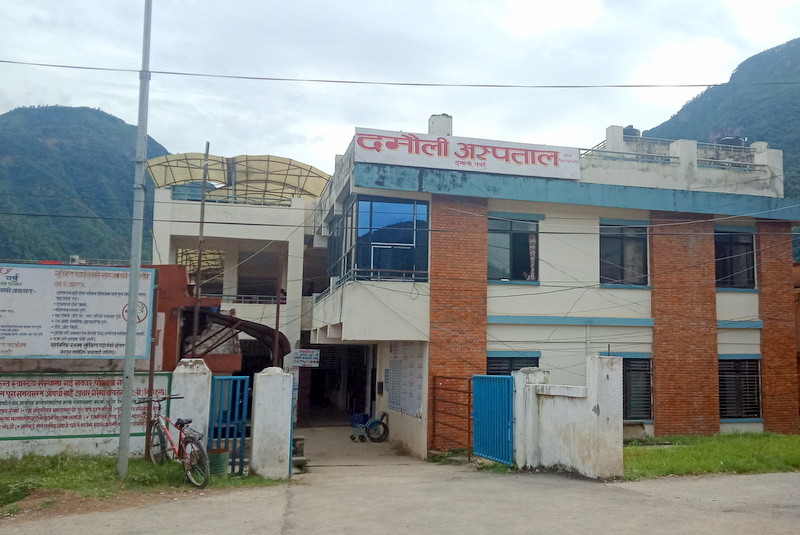

तनहुँ। तनहुँ सदरमुकाम दमौलीस्थित प्रदेश अस्पतालले स्तरोन्नतिका लागि जग्गा प्राप्ति भएको छ।
नेपाल सरकार भूमि व्यवस्था, सहकारी तथा गरिबी निावरण मन्त्रालयको गत २६ कात्तिकमा भएको निर्णयअनुसार जिल्ला समन्वय समिति, कृषि विकास कार्यालय, भेटेरीनरी अस्पताल तथा पशु सेवा विज्ञ केन्द्रका नाममा जग्गाधनी दर्ता श्रेस्ता कायम रहेको ७ रोपनी जग्गा अस्पताललाई उपयोग गर्न दिइने भएको हो।
मालपोत कार्यालयले १९ माघमा प्रदेश अस्पताल दमौलीलाई जग्गा उपयोगको प्रमाणपत्र उपलब्ध गराएको मालपोत प्रमुख राजेन्द्रप्रसाद पौडेलले जानकारी दिए। उनका अनुसार जिल्ला समन्वय समितिको नाममा रहेको ५ रोपनी, कृषि विकास कार्यालयको नाममा रहेको २ रोपनी र भेटेरीनरी अस्पतालको नाममा रहेको १ रोपनी जग्गा अस्पताललाई उपलब्ध गराइएको हो।
जग्गा उपयोग गर्न दिइए पनि केही शर्तहरू राखिएको छ। पौडेलका अनुसार उपयोग गर्न दिइएको जग्गा अतिक्रमण हुन नपाउनेगरी उचित संरक्षण र संवर्द्धन गर्नुपर्ने छ। त्यस्तै उपयोग गर्न दिइएको जग्गा नाफामूलक तथा व्यापारिक कार्यमा प्रयोग गर्न, कुनै व्यक्ति वा निकायलाई प्रयोग गर्न दिन वा भाडामा दिन नपाइने पौडेलले जानकारी दिए।
जुन प्रयोजनका लागि माग गरिएको हो सोही प्रयोजनमा मात्र उपयोग गर्नुपर्ने, उद्देश्यअनुरुपको कार्यमा प्रयोग नगरेमा पूर्वाधारसहितका जग्गा नेपाल सरकारले लिनसक्ने उनले बताए।
जग्गा प्राप्ति नहुँदा स्तरोन्नति रोकिएको अस्पतालको अब स्तरोन्नति हुने निश्चित भएको अस्पताल व्यवस्थापन समितिका अध्यक्ष कमलामोहन वाग्लेले बताए। गण्डकी प्रदेश सरकारले अस्पताललाई ५० शैय्यामा स्तरोन्नति गर्ने निर्णय गरिसकेको छ । उक्त निर्णयसँगै अस्पतालमा ८ जना विशेषज्ञ चिकित्सकको दरबन्दी स्वीकृत भएको छ।
विसं २०३४ मा स्वास्थ्यचौकीका रूपमा स्थापना भएको यो स्वास्थ्य केन्द्र २०५५ सालमा प्राथमिक स्वास्थ्य केन्द्र तथा २०५९ सालमा अस्पतालकामा स्तरोन्नति भएको थियो।
अस्पतालमा फोहरपानीको व्यवस्थापन, फोहरमैला व्यवस्थापनका लागि अटोक्लेप्ससहितको भवन निर्माण, आँखा विशेषज्ञसहितको सेवा सञ्चालन, अत्याधुनिक दाँत सेवा, एनेस्थेसिया सेवा, भेन्टिलेटरसहित आइसीयू कक्ष, अत्याधुनिक ल्याब सेवा, डिजिटल एक्सरे, निःशुल्क औषधि कक्षलगायतका सेवा विस्तार भइसकेको छ।
साथै शव राख्नका लागि २ तह भएका २ वटा मर्चरी चेम्बरको पनि अस्पतालमा व्यवस्था गरिएको छ। अस्पतालले इमर्जेन्सी सेवा, फार्मेसी, एआरटी, ल्याव्रोटोरी, दन्त, आँखा सेवाका अतिरिक्त मानसिक उपचार र डायलाइसिस सेवासमेत प्रदान गर्दै आइरहेको अस्पतालले जनाएको छ।